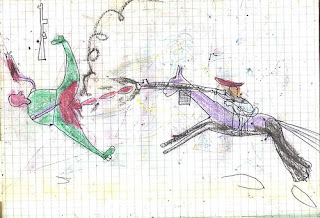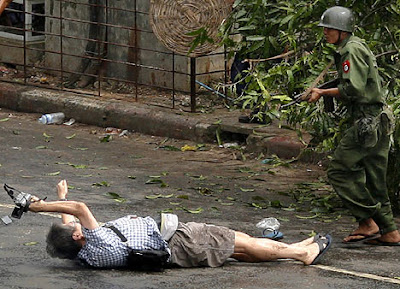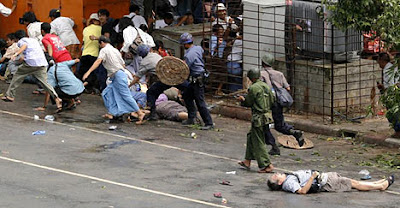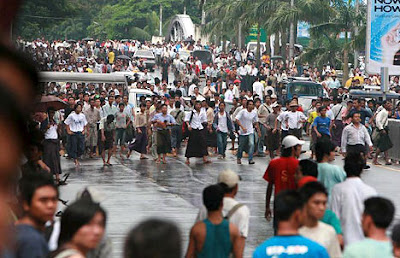This evening, as I made my way from Orchard MRT to the Myanmar Embassy to sign the petition to voice my revulsion at the brutal quelling of peaceful protests in Myanmar last week, I saw two prostitutes in front of Orchard Delphi (near the junction with Claymore Road) soliciting for clients. Their target clients were clear: single, Caucasian men.
A short distance down, as I walked up St Martin’s Drive where the embassy is located, I saw two policemen and a policewoman in plain clothes doing nothing but standing there eyeing every one walking up towards the diplomatic mission. At the embassy’s entrance, where a round-the-clock candlelight vigil is being held, another three or four policemen where there doing nothing productive except manning a videocamera mounted on a tripod, filming all the visitors as they went by.
I walked back down towards the MRT station a few minutes later. Those two prostitutes were gone (presumably with their clients). But again, in front of Delphi, another three prostitutes were there, smiling at Caucasian men who walked by and sometimes taking them by the hand and whispering something into their ears. None of the men succumbed to their charms.
I felt frustrated by this situation. Many tourists come to Singapore expecting a clean, wholesome place, free of vices normally associated with inner cities and Third World countries. Many of those men who were approached probably had a whole different story about Singapore to tell to their friends and family back home.
I decided to call the nearby police station to report this. The officer on the line told me he had sent in a request to the patrol, and that police officers will be there very soon. I waited for 10 minutes, and seeing no police car arriving, decided to just go home. However just down the road, I saw another policeman who looked like he was booking a motorist for a traffic violation. I approached him and reported the soliciting prostitutes. He told me plainly (albeit politely) that he did not have the authority to approach them, but would call in the anti-vice unit to have them handle it.
I don’t know what the outcome of this is. Perhaps the policemen eventually came. But what I can’t fit together is why our police would waste the manpower of six to 7 officers to eye a small candlelight vigil, while taking so long to respond to actual criminal activity taking place nearby.
What are their priorities? Keeping our streets safe and free of vice activities, or playing Steven Spielburg and filming and intimidating people who are peacefully expressing their genuine concern for their fellow human beings in Myanmar?
Update:
I wrote separately to the police’s “SPF Service Improvement Unit” to complain about the lack of enforcement all these years. This was their reply:
“Dear Sir
We refer to your email of 4 October 2007.
Police will continue to monitor the situation in Orchard Road closely and
will take enforcement action where necessary against any illegal
activities.
We thank you for your feedback.”
I encourage readers to call the police to report every time you see prostitutes soliciting in the Orchard Road area (prostitution is not illegal, but soliciting is). The number to call is 1800-7359999 (Orchard Police Post).
Once they get more complaints, they will feel under pressure to act on it. If no one complains, they will just continue to “close one eye” to the situation.




